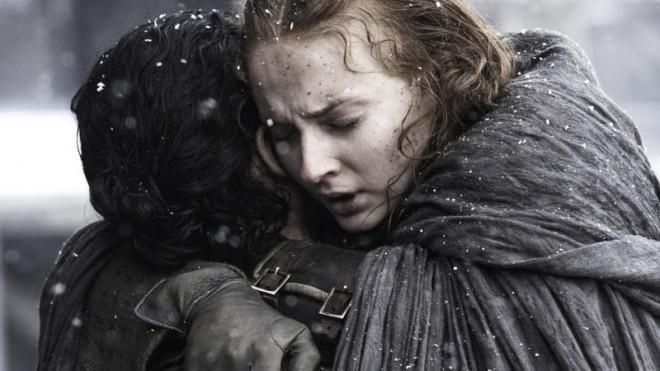What a time to be alive. Just as our republic appears to be tearing itself apart over a self-contradictory presidential candidate, the leading TV entertainment of our times is at war with the the author who thought it up in the first place.
What's more unusual, the TV side is winning — and that has never been clearer than when you compare this week's episode side-by-side with the author's latest effort to entertain us.
It's a friendly war, of course, far more genteel than any battle you'll witness on the show. Game of Thrones showrunners David Benioff and Dan Weiss have only nice words for George R.R. Martin, the author who remains an executive producer (but hasn't written an episode since Season 4).
For years, all three of them have been warning us of the "butterfly effect" — the fact that even the smallest changes to the book narrative will have a larger and larger impact as the TV show unfolds.
But there's another important thing going on here: the showrunners are moving existing characters into dramatic situations, while Martin keeps his focus on new people and reducing the drama — intentionally or otherwise.
Picture the two stories as separate chess games. Benioff and Weiss' game is full of brutal and fascinating clashes between high-stakes pieces. At the same time, the number of pieces on the board is being winnowed down at increasing speed.
Martin's much slower game has the pieces we care about stuck in place, while pawns plod up the board square by square. Furthermore, he keeps pulling pawns out of his pocket to add to the board. He loves those pawns and their plots!
That's fair enough. His game, his rules. Martin may yet be building up to the more interesting finale, in two books and the Red God knows
how many years.

Sansa Stark: Now in a much better place on the show than in the books.
But you certainly can't blame his spectators for yawning in the meantime, or for intuitively feeling he's violating the laws of good storytelling.
His story specifically began with the Stark family, has always centered on the Starks, and now Martin seems relatively uninterested in their fate — their only purpose in the narrative to be kept cruelly apart.
On Sunday, the show gave us a glimpse of something we've been craving from the beginning: The first of what could be many Stark family
reunions, in this case Sansa and Jon Snow. It did not feel cheaply won or unrealistic, given how many times the Starks have just missed each other before.
For viewers, it seemed just the right emotional beat at the right time. We needed some hope, and we loved the surprising side-effect of Brienne and Tormund meeting.
You wouldn't have thought to put those two together before; now you can't imagine them apart. This is just the kind of connection a compelling story should make.
Contrast that with the Sansa of the books, who is still stuck in the Vale under the creepy dominion of Littlefinger and the assumed name of Lady Alayne Stone. Meanwhile, Brienne and Podrick are miles away on a fruitless quest for Sansa, unaware that they have lost her trail completely.
In one of the first pre-released chapters from his next novel, Winds of Winter, Martin caught us up at length with Alayne's rather uninteresting life and her meeting with someone named Harry the Heir. Great, I thought when I read it — another new character we have to remember and attempt to care about.
Last week, Martin released another advance chapter covering events in Dorne. Specifically, it's from the viewpoint of a character, Arianne Martell, whom the show has deemed too uninteresting to adapt.
Advertising
Martin apparently introduced the chapter at readings as early as 2011. So why publish it online now? Perhaps because the show had just killed off three characters that remain in the books — Princess Myrcella Baratheon, her betrothed, Trystane Martell, and Prince Doran — and the chapter specifically reminds us they are alive.
But it also served to remind us how dull the average Dornish chapter reads. Arianne is on her way to meet yet another new couple of characters who have inserted themselves in the narrative. Big whoop.
"One of the things the show and the books have in common is that Dorne is essentially a giant bog where plot and entertainment go to die," wrote the New Republic. At least the show solved its Dornish problem in the space of two stabbings and one poisoning.
Martin cannot do this. He is committed to his Dorne story, and keeps straining to tie it into the larger narrative. He has painted himself into a corner, something he has admitted doing before. He is stuck in the bog.

Given that, you really can't fault Martin for taking so long to finish Winds of Winter, for focusing on tales from earlier in Westeros' history, or for diverting himself with other projects such as the Wild Cards anthology. He's on his own schedule. We don't have to like it, but we don't have to beat him up for it.
And it's not as if the show is making all the right choices, either. In its insatiable search for drama, it is showing us scenes that Martin has decreed impossible — such as allowing Daenerys to survive a giant Dothraki fire for a second time, with no clear explanation as to why.
As book readers will tell you, the Khaleesi's survival after she walked into Khal Drogo's funeral pyrewas supposed to be a one-time thing, and was based on the blood magic that attempted to bring Drogo back to life. Benioff and Weiss may have turned Dany into too much of a superhero.
But the voices of reader outrage are drowned out by the gratitude of show fans, who were pulling for Dany to get out of Vaes Dothrak as soon as possible. We cheered for a memorable scene that celebrated female empowerment.
And because Dany had survived the flames before, it made intuitive sense that she would do so again — George R.R. Martin be damned. The show has the reins of the popular narrative now, as firmly as Trump has seized control of the GOP narrative. In this case, at least, both sides can still win.

